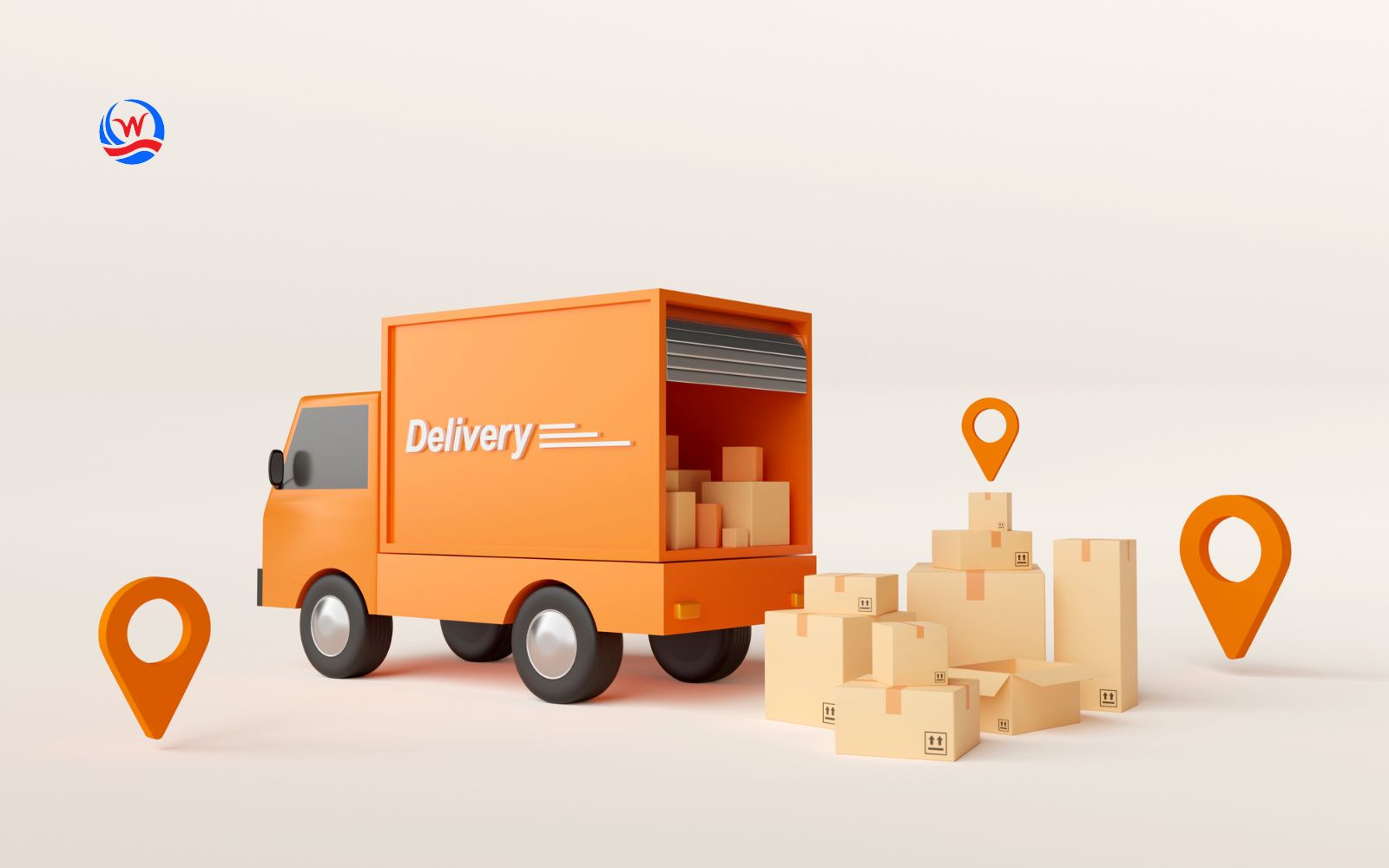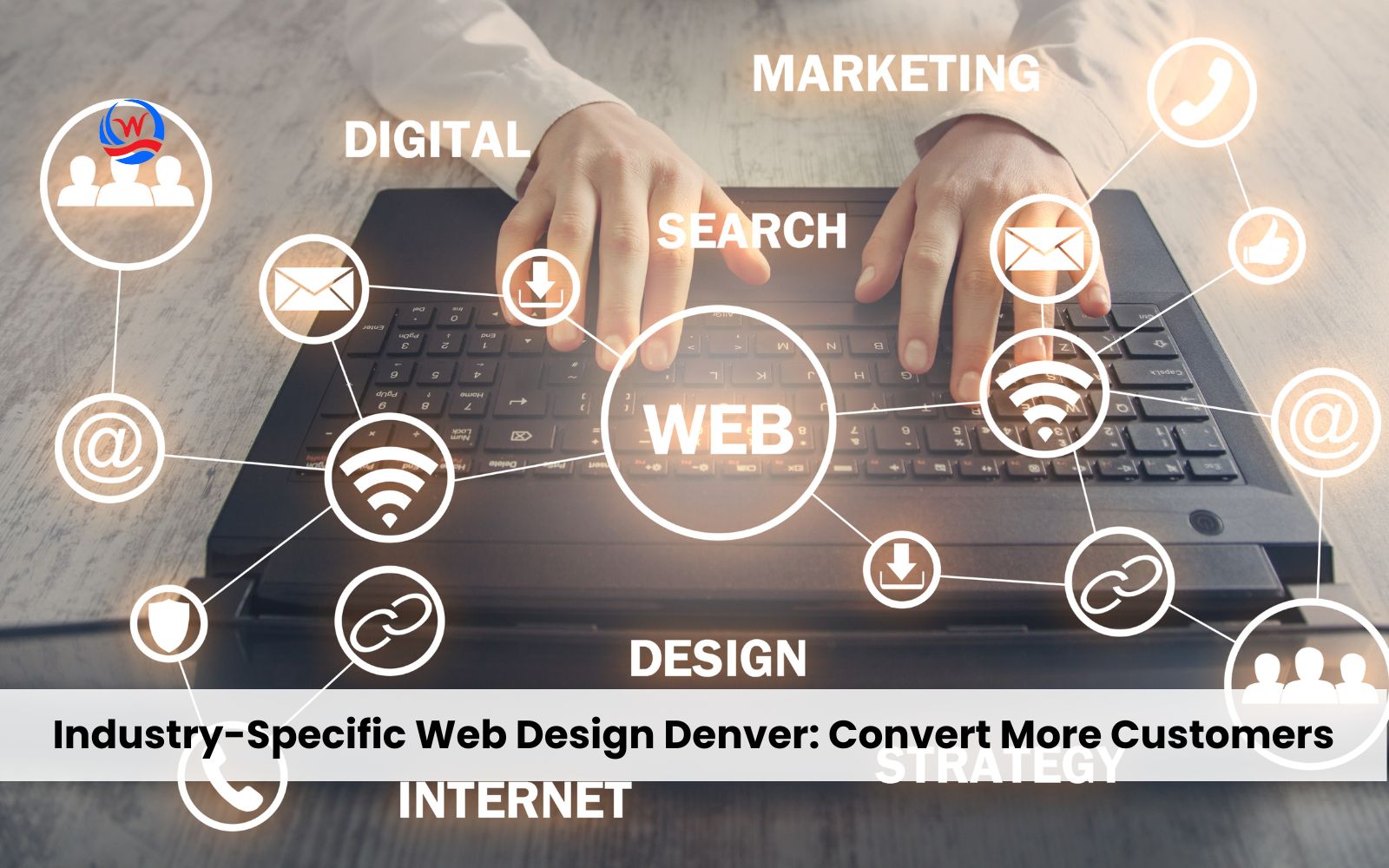You wouldn’t expect a tech startup’s website to look like a law firm’s, right? That’s because different industries have vastly different web design requirements and customer expectations. When your Denver business speaks directly to your industry’s unique needs through specialized web design, you’re not just creating a website – you’re building a conversion machine.
Denver businesses using industry-specific design see 73% higher conversion rates than generic websites.
This comprehensive guide explores how industry-specific web design Denver can transform your online presence. We’ll dive deep into conversion-optimized web design Denver strategies for healthcare, tech startups, e-commerce, real estate, manufacturing, restaurants, and professional services.
Why Industry-Specific Web Design denver Matters for Businesses
Denver web design conversion specialists report that businesses using industry-specific design elements achieve 127% higher lead generation compared to generic approaches. When your website immediately communicates that you understand your industry’s challenges, visitors trust you more and convert faster.
Industry-specific user expectations run deep. Healthcare patients expect HIPAA-compliant appointment scheduling, while tech users demand cutting-edge interfaces and seamless functionality. Restaurant visitors want mouth-watering visuals and easy ordering, whereas manufacturing prospects need detailed specifications and technical documentation. Meeting these expectations builds instant credibility.

Common pain points solved by industry-focused design include: visitor confusion due to irrelevant messaging, high bounce rates from misaligned content, poor lead quality from generic contact forms, and missed conversions from inappropriate calls-to-action. Each industry has specific navigation patterns, information hierarchies, and trust signals that generic designs simply can’t address.
In Denver’s competitive market, specialized design provides crucial advantages. While competitors use cookie-cutter templates, your industry-specific website positions you as the obvious expert choice.
| Industry | Generic Website Conversion | Industry-Specific Conversion | ROI Increase |
| Healthcare | 2.1% | 4.8% | 128% |
| Tech Startups | 3.2% | 7.1% | 122% |
| E-commerce | 2.8% | 6.4% | 129% |
| Real Estate | 1.9% | 4.2% | 121% |
Ready to see these results for your business? Contact The Ocean Wide at (720) 334-0899 or [email protected] for your free industry-specific strategy session.
Key Components of Conversion-Optimized Web Design for Any Industry
Before diving into industry specifics, let’s establish universal conversion fundamentals that every high-converting Denver web design incorporates:
- Clear, compelling calls-to-action positioned strategically throughout each page
- Intuitive navigation that guides visitors toward conversion goals
- Social proof integration through testimonials, reviews, and case studies
- Fast loading speeds under 3 seconds to prevent visitor abandonment
- Professional visual hierarchy directing attention to key conversion elements
- Trust signals including security badges, certifications, and contact information
- Mobile-first responsive design ensuring seamless experiences across devices
Mobile optimization deserves special attention in Denver, where 68% of local business searches happen on mobile devices. Your website must deliver flawless mobile experiences, from thumb-friendly navigation to streamlined checkout processes.
Page speed directly impacts conversion rates—even a one-second delay reduces conversions by 7%. Basic optimization includes image compression, browser caching, and clean code structure.

However, true conversion optimization requires continuous A/B testing of headlines, button colors, form fields, and page layouts.
Data-driven design methodology involves setting conversion baselines, implementing tracking systems, testing variations systematically, and iterating based on performance metrics. This scientific approach ensures your website continuously improves rather than remaining static.
Industry Deep Dive: Healthcare Website Design
Denver’s healthcare landscape presents unique digital challenges. With over 45 major healthcare facilities and countless private practices, standing out requires specialized expertise in healthcare website design services Denver.
HIPAA compliance forms the foundation of healthcare web design. Your website must protect patient data through secure contact forms, encrypted communications, and compliant hosting environments. Non-compliance risks devastating fines and reputation damage.
Essential healthcare website features include:
- Online appointment scheduling integrated with practice management systems
- Patient portal access for secure communication and records
- Insurance verification tools streamlining administrative processes
- Telemedicine capabilities meeting modern patient expectations
- Multilingual support serving Denver’s diverse population
- Emergency contact information prominently displayed
Trust-building elements specific to healthcare include physician credentials, patient testimonials, before/after galleries (where appropriate), and clear privacy policies. Your website must immediately communicate competence and compassion.
Patient journey mapping reveals critical conversion points: initial symptom research, provider comparison, appointment booking, and post-visit follow-up. Each touchpoint requires optimized design elements that reduce friction and build confidence.
Industry Deep Dive: Tech Startup Web Design
Denver’s thriving tech ecosystem, supported by organizations like the Colorado Technology Association, demands sophisticated tech startup website design in Denver that matches visitor expectations for innovation and functionality.
Tech-savvy visitors expect cutting-edge design, lightning-fast performance, and intuitive user experiences. They’ll quickly abandon sites that feel outdated or perform poorly. Your website becomes a direct reflection of your technical capabilities.
Essential features for tech startup websites include:
- Interactive product demos showcasing functionality without requiring downloads
- API documentation for developer audiences
- Investor resources including pitch decks and financial highlights
- Career sections attracting top talent
- Customer success stories with quantifiable results
- Integration showcases demonstrating platform connectivity
Balancing innovative design with conversion fundamentals requires careful consideration. While creative elements attract attention, they shouldn’t interfere with clear messaging and conversion paths. Your design should feel cutting-edge while maintaining usability.
Scalability considerations become crucial as startups grow. Your website architecture must accommodate expanding product lines, team members, and content volumes without requiring complete rebuilds.
Industry Deep Dive: E-commerce Web Design for Retailers
Denver’s retail landscape offers unique opportunities for e-commerce web design for Denver startups and established retailers. Local delivery options and pickup services create competitive advantages over national competitors.
Local delivery and pickup considerations specific to the Denver metro area include integration with services like DoorDash and Grubhub, clear delivery zone maps highlighting service areas, and pickup scheduling systems for customer convenience.
Key e-commerce conversion elements include:
- High-quality product photography with zoom functionality and multiple angles
- Detailed product descriptions addressing common customer questions
- Customer reviews and ratings building social proof
- Related product suggestions increasing average order values
- Abandoned cart recovery systems recapturing lost sales
- Guest checkout options reducing purchase friction
Mobile purchasing optimization becomes critical when 57% of Denver consumers research products on mobile before buying. Your mobile checkout process must be streamlined, secure, and user-friendly.

| Cart Abandonment Prevention | Implementation Difficulty | Impact Level |
| Guest checkout option | Easy | High |
| Progress indicators | Easy | Medium |
| Security badges | Easy | High |
| Exit-intent popups | Medium | Medium |
| Saved cart reminders | Hard | High |
Industry Deep Dive: Real Estate Web Design
Denver’s competitive real estate market, with median home prices fluctuating rapidly, demands real estate website development Denver that showcases properties effectively while capturing leads efficiently.
Property showcase strategies emphasize visual presentation through high-resolution photography, virtual tours, and drone footage highlighting Denver’s mountain views and neighborhood character. Your website becomes the first showing for most potential buyers.
Neighborhood-specific content organization helps visitors explore Denver’s diverse areas—from LoDo’s urban energy to Cherry Creek’s upscale shopping. Interactive maps, school district information, and local amenity highlights provide valuable context.
Essential real estate website features include:
- Advanced property search with filters for price, location, and amenities
- Mortgage calculators helping buyers understand affordability
- Market reports demonstrating expertise and building trust
- Agent profiles personalizing the buying/selling experience
- CMA tools for sellers wanting property valuations
- Neighborhood guides showcasing local expertise
Lead capture mechanisms must differentiate between buyers and sellers, customizing follow-up strategies accordingly. Sellers need market analysis tools, while buyers want property alerts and viewing schedules.
Industry Deep Dive: Manufacturing Web Design
Denver’s manufacturing sector faces unique B2B digital challenges. Manufacturing industry web design Denver must balance technical specifications with user-friendly navigation, serving both engineers and procurement managers.
Technical specification presentation requires organized data tables, downloadable CAD files, and comparison tools. However, overwhelming visitors with technical details can hurt conversions. The key lies in progressive disclosure—providing high-level benefits upfront with detailed specifications available on demand.
Key conversion elements for manufacturing websites include:
- Request for quote (RFQ) systems streamlining the sales process
- Product catalogs with detailed specifications and downloadable resources
- Case studies demonstrating successful applications
- Certification displays building credibility and compliance confidence
- Distributor locators connecting prospects with local representatives
Balancing technical detail with user-friendly navigation requires clear information architecture. Primary navigation should focus on solutions and applications, while technical specifications remain easily accessible but not prominent.

Lead qualification strategies involve progressive forms that gather project details gradually, preventing overwhelming prospects while collecting necessary information for accurate quotes.
| Website Focus | B2B Manufacturing | B2C Manufacturing |
| Primary Goal | Lead Generation | Direct Sales |
| Content Depth | Technical Specifications | Product Benefits |
| Sales Process | Relationship-Based | Transaction-Based |
Industry Deep Dive: Restaurant & Hospitality Web Design
Denver’s vibrant culinary scene, from food trucks to fine dining, requires restaurant web design services Denver that stimulate appetites and drive reservations or orders.
Design principles for appetite stimulation center on high-quality food photography, warm color schemes, and immersive visual experiences. Your website should make visitors hungry and eager to visit.
Essential restaurant website features include:
- Online reservation systems integrated with table management software
- Digital menus with mouth-watering descriptions and dietary information
- Online ordering for takeout and delivery
- Event booking for private parties and catering
- Location and hours prominently displayed
- Social media integration showcasing customer experiences
Mobile-first design becomes crucial when 76% of Denver diners search for restaurants on mobile devices while on-the-go. Your mobile experience must load quickly and provide essential information immediately.
Online ordering and reservation integration requires seamless connections with existing restaurant management systems. Poor integration creates operational headaches and customer frustration.
Industry Deep Dive: Professional Services Web Design
Professional services in Denver—from legal firms to consulting agencies—require websites that establish credibility and expertise while generating qualified leads.
Credibility-building design elements include professional photography, client testimonials, case studies, and prominent credentials. Your website must immediately communicate competence and trustworthiness.
Content organization strategies for complex service offerings involve:
- Service-specific landing pages targeting different client needs
- Resource libraries demonstrating expertise through valuable content
- Team profiles personalizing professional relationships
- Process explanations reducing client anxiety about working with you
Lead qualification through strategic form design prevents wasting time on unqualified prospects. Progressive forms collect essential information while maintaining user-friendly experiences.
Thought leadership presentation strategies include regularly updated blogs, industry insights, and speaking engagement highlights. Position your firm as the go-to expert in your field.
| Professional Service | Primary Trust Builder | Content Focus |
| Legal | Credentials & Results | Case Studies |
| Accounting | Certifications | Tax Updates |
| Consulting | Client Success | Industry Insights |
Measuring Success: Industry-Specific KPIs and Analytics
Measuring website performance requires industry-specific metrics that align with business objectives. Generic analytics miss crucial conversion indicators unique to each sector.
| Industry | Primary KPI | Secondary KPIs | Conversion Goals |
| Healthcare | Appointment Bookings | Page Views, Form Submissions | Patient Acquisition |
| Tech Startups | Demo Requests | User Engagement, Content Downloads | Trial Signups |
| E-commerce | Sales Revenue | Cart Abandonment, AOV | Purchase Completion |
| Real Estate | Lead Generation | Property Views, Contact Forms | Listing Inquiries |
| Manufacturing | RFQ Submissions | Catalog Downloads, Spec Views | Quote Requests |
| Restaurants | Reservations/Orders | Menu Views, Location Searches | Visit Conversion |
Setting appropriate conversion goals requires understanding industry benchmarks while considering your specific circumstances. A new practice might focus on awareness metrics, while established businesses target direct conversions.

Analytics setup considerations include implementing industry-specific tracking, such as appointment confirmation tracking for healthcare or product page funnels for e-commerce. Custom event tracking provides insights beyond standard analytics.
A/B testing strategy components include:
- Headline variations testing different value propositions
- CTA button optimization examining colors, text, and placement
- Form field testing balancing information needs with user experience
- Layout experiments comparing different page structures
- Content testing evaluating different messaging approaches
ROI calculation methods vary by industry but generally follow: (Revenue Increase – Design Investment) / Design Investment × 100 = ROI%. For service businesses, calculate based on customer lifetime value rather than individual transactions.
Frequently Asked Questions (FAQs)
u003cstrongu003eHow long does an industry-specific web design project take?u003c/strongu003e
Most industry-specific web design projects take 6-12 weeks, depending on complexity and content requirements. The process includes industry research, design development, content creation, and optimization phases.
u003cstrongu003eWhat’s the difference between regular web design and industry-specific?u003c/strongu003e
Industry-specific design incorporates sector-specific features, compliance requirements, user expectations, and conversion strategies that generic designs cannot address effectively.
u003cstrongu003eIs industry-specific web design more expensive?u003c/strongu003e
While initial investment may be higher, industry-specific design delivers significantly better ROI through improved conversion rates and reduced marketing costs.
u003cstrongu003eCan you redesign my current site for my specific industry?u003c/strongu003e
Absolutely! We specialize in transforming generic websites into industry-optimized conversion machines.
Why The Ocean Wide Is Denver’s Go-To Web Design Partner
The Ocean Wide brings extensive experience across Denver’s key industries, understanding the unique challenges and opportunities each sector faces. Our team doesn’t just create beautiful websites – we build conversion-optimized solutions that drive measurable business growth.
Our focus on CRO, SEO, and mobile UX best practices ensures your website doesn’t just look professional but performs exceptionally. We combine industry expertise with data-driven optimization, continuously improving your site’s performance.
Our proven local results speak for themselves. Denver businesses working with The Ocean Wide see average conversion rate improvements of 94% within six months. We understand Denver’s market dynamics and consumer behavior patterns.
Ready to transform your online presence? Schedule your free industry-specific website strategy session today. Call (720) 334-0899 or email [email protected] to discover how industry-specific design can revolutionize your digital marketing results.
Conclusion
Industry-specific web design Denver isn’t just a nice-to-have – it’s essential for competitive success. Generic websites can’t address the unique challenges, expectations, and conversion paths specific to your industry. When your website speaks directly to your audience’s needs, conversion rates soar.
The conversion and competitive advantages are clear: higher lead quality, improved user engagement, increased trust and credibility, and ultimately, better ROI on your digital marketing investment. Your industry-specialized website becomes your most effective sales tool.
